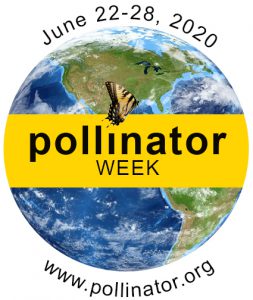For the 13th year we celebrate National Pollinator Week June 22-28 to bring awareness to the importance of our pollinators and the challenges they face. This is an opportunity to learn about ways to protect pollinators in our own landscapes. Every one of us can make a difference.
When we hear the word ‘pollinator’ most of us immediately think of honeybees. They are very important but there are so many other creatures that are important pollinators:
- Native bees – Florida alone has over 300 species of bees
- Hummingbirds – their long beaks can reach into long, tubular blooms
- Bats – they pollinate over 500 plants including banana, mango, and agave (used to make tequila)
- Beetles – considered to be a messy and minor pollinator; they pollinate the native paw paw
- Butterflies – a minor pollinator as most have long legs that keep them perched above the pollen
- Flies – pollinators of a variety of native plants
According to the USDA, 75% of flowering plants and about 35% of food crops around the globe rely on these animals for pollination. Without pollination, these plants would not reproduce or provide us food.
So, what can the average person do to make a difference?
- Plant what bees and butterflies love!
- Avoid using any insecticide unless it is absolutely necessary. Predators like assassin bugs, dragonflies and birds help to keep pests in check. Our songbirds rely on protein-rich insects (especially caterpillars) to feed their growing babies.
- Don’t treat areas where pollinators are visiting the flowers, whether in the lawn or the landscape beds.
- If you need to apply an insecticide to the lawn, mow first to remove the blooms from any weeds. Always follow the label instructions carefully.
- Avoid using a systemic insecticide on plants that bloom and attract pollinators. The insecticide can remain in plants for a long time.
Happy gardening during National Pollinator Week!
For more information:
Pollinator Partnership: Pollinator Week Activities
US Fish & Wildlife Pollinator Site
Native Insect Pollinators of the Southeastern United States brochure
Purdue University: Protecting Pollinators in Home Lawns and Landscapes
Minimizing Honey Bee Exposure to Pesticides
- Sugar Belle Mandarin: A Great Choice for the Florida Panhandle - November 22, 2021
- LandscapeQ & A - August 20, 2021
- Let’s Talk Beneficial Insects - August 18, 2021
